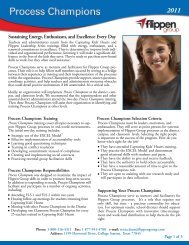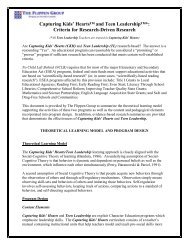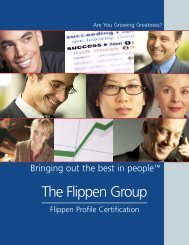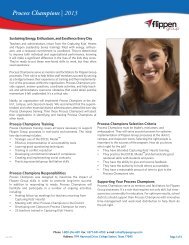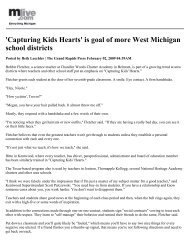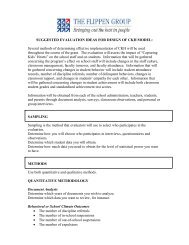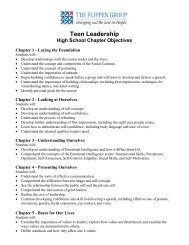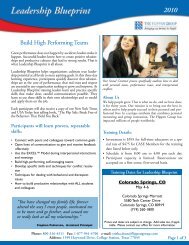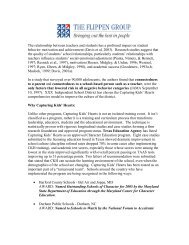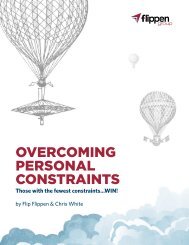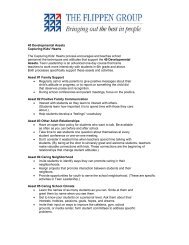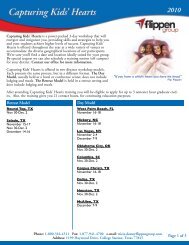- Page 1 and 2:
A Report to the NationSmart & GoodH
- Page 3 and 4:
A wonderful piece of work that addr
- Page 5 and 6:
Dedicated to the memory ofWinifred
- Page 7 and 8:
AcknowledgementsWe would like to ex
- Page 9 and 10:
Table of ContentsLetter to the Read
- Page 11 and 12:
ELC PRINCIPLE 4: TAKE PERSONAL RESP
- Page 13 and 14:
1. Develop Critical Friends Groups
- Page 15 and 16:
Letter to The Reader“Are you a he
- Page 17 and 18:
Letter to the ReaderBut we also do
- Page 19 and 20:
How to Read This Reporttices relate
- Page 21 and 22:
Patrick Bassett, president, Nationa
- Page 23 and 24:
Research Methodologyand Criteria fo
- Page 25 and 26:
Research Methodology and Criteria f
- Page 27 and 28:
Principles of a Smart & Good High S
- Page 29 and 30:
CHAPTER 1The Call to Character:Perf
- Page 31 and 32:
est work and be their best ethical
- Page 33 and 34:
CHAPTER 1: The Call to Charactercha
- Page 35 and 36:
CHAPTER 1: The Call to Charactertin
- Page 37 and 38:
CHAPTER 1: The Call to CharacterA S
- Page 39 and 40:
CHAPTER 1: The Call to CharacterBec
- Page 41 and 42:
CHAPTER 1: The Call to CharacterTHE
- Page 43 and 44:
1C. Peterson & M. P. Seligman, Char
- Page 45 and 46:
CHAPTER 2: Performance Character an
- Page 47 and 48:
Smart & Good High SchoolsCHAPTER 2:
- Page 49 and 50:
CHAPTER 2: Performance Character an
- Page 51 and 52:
CHAPTER 2: Performance Character an
- Page 53 and 54:
CHAPTER 2: Performance Character an
- Page 55 and 56:
do not self-identify as “characte
- Page 57 and 58:
CHAPTER 2: Performance Character an
- Page 59 and 60:
EndnotesCHAPTER 2: Performance Char
- Page 61 and 62:
CHAPTER 3: The Ethical Learning Com
- Page 63 and 64:
CHAPTER 3: The Ethical Learning Com
- Page 65 and 66:
CHAPTER 3: The Ethical Learning Com
- Page 67 and 68:
CHAPTER 3: The Ethical Learning Com
- Page 69 and 70:
Galvanized by this finding, she and
- Page 71 and 72:
CHAPTER 3: The Ethical Learning Com
- Page 73 and 74:
(1) scheduling a weekend retreat in
- Page 75 and 76:
CHAPTER 3: The Ethical Learning Com
- Page 77 and 78:
person has gifts; and the convictio
- Page 79 and 80:
CHAPTER 3: The Ethical Learning Com
- Page 81 and 82:
CHAPTER 3: The Ethical Learning Com
- Page 83 and 84:
CHAPTER 3: The Ethical Learning Com
- Page 85 and 86:
CHAPTER 3: The Ethical Learning Com
- Page 87 and 88:
CHAPTER 3: The Ethical Learning Com
- Page 89 and 90:
CHAPTER 4The Professional Ethical L
- Page 91 and 92:
CHAPTER 4: The Professional Ethical
- Page 93 and 94:
CHAPTER 4: The Professional Ethical
- Page 95 and 96:
CHAPTER 4: The Professional Ethical
- Page 97 and 98:
CHAPTER 4: The Professional Ethical
- Page 99 and 100:
CHAPTER 4: The Professional Ethical
- Page 101 and 102:
CHAPTER 4: The Professional Ethical
- Page 103 and 104:
CHAPTER 4: The Professional Ethical
- Page 105 and 106:
CHAPTER 4: The Professional Ethical
- Page 107 and 108:
CHAPTER 4: The Professional Ethical
- Page 109 and 110:
CHAPTER 4: The Professional Ethical
- Page 111 and 112:
CHAPTER 4: The Professional Ethical
- Page 113 and 114:
CHAPTER 5: Fostering the 8 Strength
- Page 115 and 116:
Smart & Good High SchoolsCHAPTER 5:
- Page 117 and 118:
CHAPTER 5: Fostering the 8 Strength
- Page 119 and 120:
CHAPTER 5: Fostering the 8 Strength
- Page 121 and 122:
CHAPTER 5: Fostering the 8 Strength
- Page 123 and 124:
CHAPTER 5: Fostering the 8 Strength
- Page 125 and 126:
CHAPTER 5: Fostering the 8 Strength
- Page 127 and 128: CHAPTER 5: Fostering the 8 Strength
- Page 129 and 130: CHAPTER 5: Fostering the 8 Strength
- Page 131 and 132: CHAPTER 5: Fostering the 8 Strength
- Page 133 and 134: CHAPTER 5: Fostering the 8 Strength
- Page 135 and 136: CHAPTER 5: Fostering the 8 Strength
- Page 137 and 138: on at home. If I think something se
- Page 139 and 140: CHAPTER 5: Fostering the 8 Strength
- Page 141 and 142: Smart & Good High SchoolsCHAPTER 5:
- Page 143 and 144: CHAPTER 5: Fostering the 8 Strength
- Page 145 and 146: CHAPTER 5: Fostering the 8 Strength
- Page 147 and 148: CHAPTER 5: Fostering the 8 Strength
- Page 149 and 150: CHAPTER 5: Fostering the 8 Strength
- Page 151 and 152: CHAPTER 5: Fostering the 8 Strength
- Page 153 and 154: CHAPTER 5: Fostering the 8 Strength
- Page 155 and 156: CHAPTER 5: Fostering the 8 Strength
- Page 157 and 158: CHAPTER 5: Fostering the 8 Strength
- Page 159 and 160: CHAPTER 5: Fostering the 8 Strength
- Page 161 and 162: tragedy, injustice, and weak and si
- Page 163 and 164: CHAPTER 5: Fostering the 8 Strength
- Page 165 and 166: CHAPTER 5: Fostering the 8 Strength
- Page 167 and 168: CHAPTER 5: Fostering the 8 Strength
- Page 169 and 170: CHAPTER 5: Fostering the 8 Strength
- Page 171 and 172: CHAPTER 5: Fostering the 8 Strength
- Page 173 and 174: CHAPTER 5: Fostering the 8 Strength
- Page 175 and 176: CHAPTER 5: Fostering the 8 Strength
- Page 177: CHAPTER 5: Fostering the 8 Strength
- Page 181 and 182: CHAPTER 5: Fostering the 8 Strength
- Page 183 and 184: CHAPTER 5: Fostering the 8 Strength
- Page 185 and 186: CHAPTER 5: Fostering the 8 Strength
- Page 187 and 188: CHAPTER 5: Fostering the 8 Strength
- Page 189 and 190: CHAPTER 5: Fostering the 8 Strength
- Page 191 and 192: CHAPTER 5: Fostering the 8 Strength
- Page 193 and 194: CHAPTER 5: Fostering the 8 Strength
- Page 195 and 196: CHAPTER 5: Fostering the 8 Strength
- Page 197 and 198: CHAPTER 5: Fostering the 8 Strength
- Page 199 and 200: CHAPTER 5: Fostering the 8 Strength
- Page 201 and 202: In The Courage to Be Chaste, the pr
- Page 203 and 204: CHAPTER 5: Fostering the 8 Strength
- Page 205 and 206: CHAPTER 5: Fostering the 8 Strength
- Page 207 and 208: CHAPTER 5: Fostering the 8 Strength
- Page 209 and 210: CHAPTER 5: Fostering the 8 Strength
- Page 211 and 212: CHAPTER 5: Fostering the 8 Strength
- Page 213 and 214: CHAPTER 5: Fostering the 8 Strength
- Page 215 and 216: CHAPTER 5: Fostering the 8 Strength
- Page 217 and 218: CHAPTER 5: Fostering the 8 Strength
- Page 219 and 220: CHAPTER 5: Fostering the 8 Strength
- Page 221 and 222: CHAPTER 5: Fostering the 8 Strength
- Page 223 and 224: CHAPTER 5: Fostering the 8 Strength
- Page 225 and 226: CHAPTER 5: Fostering the 8 Strength
- Page 227 and 228: CHAPTER 5: Fostering the 8 Strength
- Page 229 and 230:
CHAPTER 5: Fostering the 8 Strength
- Page 231 and 232:
CHAPTER 5: Fostering the 8 Strength
- Page 233 and 234:
CHAPTER 5: Fostering the 8 Strength
- Page 235 and 236:
CHAPTER 5: Fostering the 8 Strength
- Page 237 and 238:
CHAPTER 5: Fostering the 8 Strength
- Page 239 and 240:
CHAPTER 6Commonly Asked Questionsab
- Page 241 and 242:
CHAPTER 6: Commonly Asked Questions
- Page 243 and 244:
CHAPTER 6: Commonly Asked Questions
- Page 245 and 246:
CHAPTER 6: Commonly Asked Questions
- Page 247 and 248:
Comprehensive EndnotesLetter to the
- Page 249 and 250:
Comprehensive Endnotesof stage-envi
- Page 251 and 252:
Comprehensive Endnotesacter Educati
- Page 253 and 254:
Comprehensive Endnotes6B. Watts Dav
- Page 255 and 256:
Comprehensive Endnotesside, 1990).3



